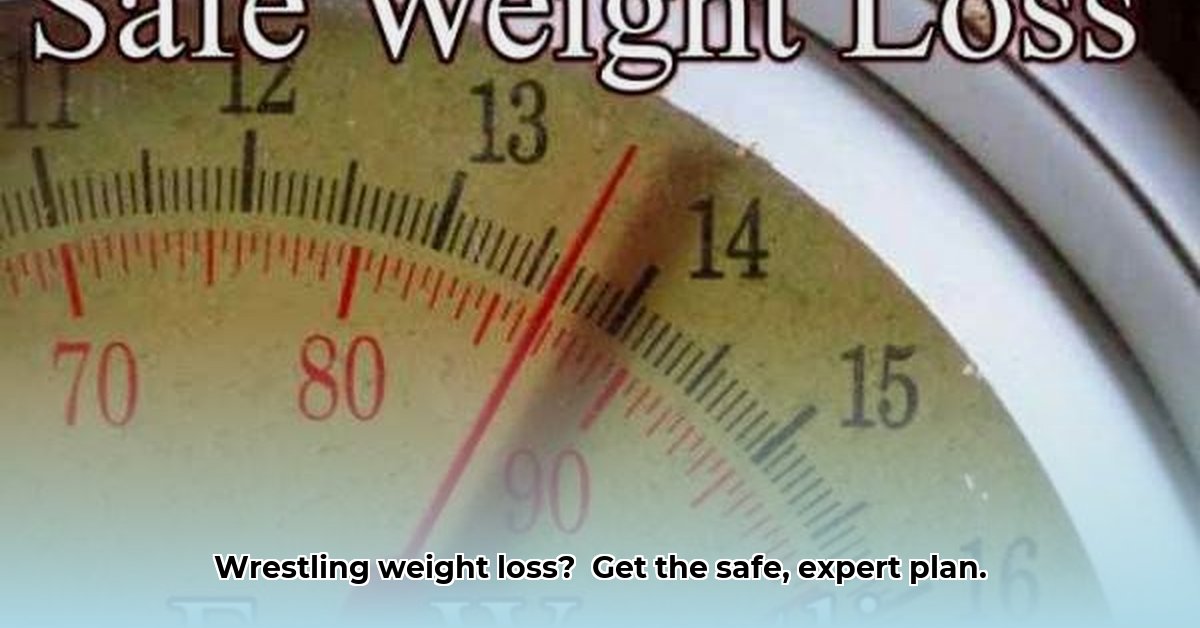
Wrestling demands peak physical condition, and managing weight effectively is crucial. However, the drive to make weight can lead to unhealthy practices. This guide provides a safe and sustainable approach, focusing on gradual fat loss and optimal nutrition for peak performance. We'll explore the risks of rapid weight loss, outline a balanced strategy, and offer actionable steps to achieve your weight goals without compromising your health.
Understanding the Risks of Rapid Weight Loss
Crash dieting, a common practice among wrestlers, carries significant health risks. Severe calorie restriction combined with rapid water weight loss can lead to dehydration, electrolyte imbalances (resulting in muscle cramps and weakness), decreased strength and endurance, and increased susceptibility to injury. These risks not only hinder athletic performance but also pose long-term health consequences. Isn't sustained success worth prioritizing over immediate weight loss?
The Balanced Approach: Gradual Fat Loss and Controlled Water Reduction
This guide champions a sustainable approach, prioritizing gradual fat loss over rapid weight reduction. This means focusing on a long-term strategy, not quick fixes. A balanced approach combines proper nutrition, strategic hydration, and adjusted training to achieve weight goals safely and effectively.
Step-by-Step Guide to Safe Weight Management
- Consult Professionals: Your first step is seeking guidance from a registered dietitian and/or a sports physician. They'll create a personalized plan tailored to your specific needs and goals. This ensures safety and maximizes results; remember, your health is paramount.
- Calorie Control: Your experts will determine a safe calorie deficit to promote gradual fat loss, protecting muscle mass and energy levels. Avoid drastic reductions.
- Strategic Hydration: Dehydration is a major risk factor in wrestling weight management. Maintain adequate hydration throughout the day, and consider electrolyte supplementation to replenish minerals lost through sweat. This is critical for both performance and recovery.
- Nutrient Timing: Your dietitian will help you strategically plan your nutrient intake in relation to your training schedule. This maximizes energy levels and muscle recovery.
- Regular Monitoring: Track your progress by regularly monitoring your weight, body composition (measure your body fat percentage), and energy levels. This allows for timely adjustments to your plan.
Nutritional Guidelines: Fueling Your Body for Optimal Performance
Nutrition forms the cornerstone of effective weight management. Your diet should emphasize:
- Sufficient Protein (0.6-0.8 grams per pound of body weight): Essential for preserving muscle mass, promoting satiety, and supporting recovery. Excellent sources include lean meats, poultry, fish, beans, lentils, and Greek yogurt.
- Complex Carbohydrates: Provide sustained energy for training and competitions. Opt for whole grains, sweet potatoes, brown rice, and quinoa over refined carbohydrates.
- Healthy Fats: Crucial for hormone production, cell function, and overall health. Include avocados, nuts, seeds, and olive oil in your diet.
- Fiber-Rich Foods: Promote digestive health and help with feeling full, aiding in calorie control. Include fruits, vegetables, and whole grains.
Sample Daily Meal Plan Template (Consult a Registered Dietitian for Personalization):
| Meal | Food Choices & Portion Suggestions |
|---|---|
| Breakfast | 3-4 oz Greek yogurt with ½ cup berries and a handful of almonds |
| Lunch | 4-5 oz grilled chicken salad with mixed greens and a light vinaigrette |
| Dinner | 4-5 oz baked salmon with 1 cup roasted vegetables |
| Snacks | Apple slices with 2 tablespoons peanut butter; a handful of almonds |
Hydration Strategies: Maintaining Optimal Fluid Balance
Adequate hydration is crucial for performance and overall health. Dehydration impairs athletic function, and it can negatively affect performance.
- Drink Plenty of Water: Even if you don't feel thirsty, drink water consistently throughout the day.
- Electrolyte Replacement: Replenish electrolytes lost through sweat, particularly sodium and potassium. Sports drinks or electrolyte tablets can be helpful, but consult your doctor or dietitian to ensure proper intake.
Training Considerations: Balancing Workouts and Weight Management
Maintain a balanced training program, adapting intensity as needed. Overtraining during a weight-loss phase can counteract your efforts and increase risk of injury. Incorporate:
- Strength Training: Preserves muscle mass and boosts metabolism.
- Cardiovascular Exercise: Burns calories and improves cardiovascular health.
- Active Recovery: Light activities on rest days aid recovery and reduce injury risk.
Monitoring Progress and Seeking Professional Support
Regularly monitor your weight, body composition, and energy levels. Track your progress and discuss your findings regularly with your dietitian and physician. They can adjust your plan accordingly and address any potential concerns.
The Long-Term Perspective: Sustainable Habits for Lasting Success
Sustainable weight management is a long-term commitment. Focus on building healthy habits that support your wrestling career and overall well-being. Avoid fad diets and extreme weight-loss methods; instead, prioritize long-term health and a balanced lifestyle. With a well-planned approach, you can achieve your weight goals while maintaining your health and maximizing your athletic potential.